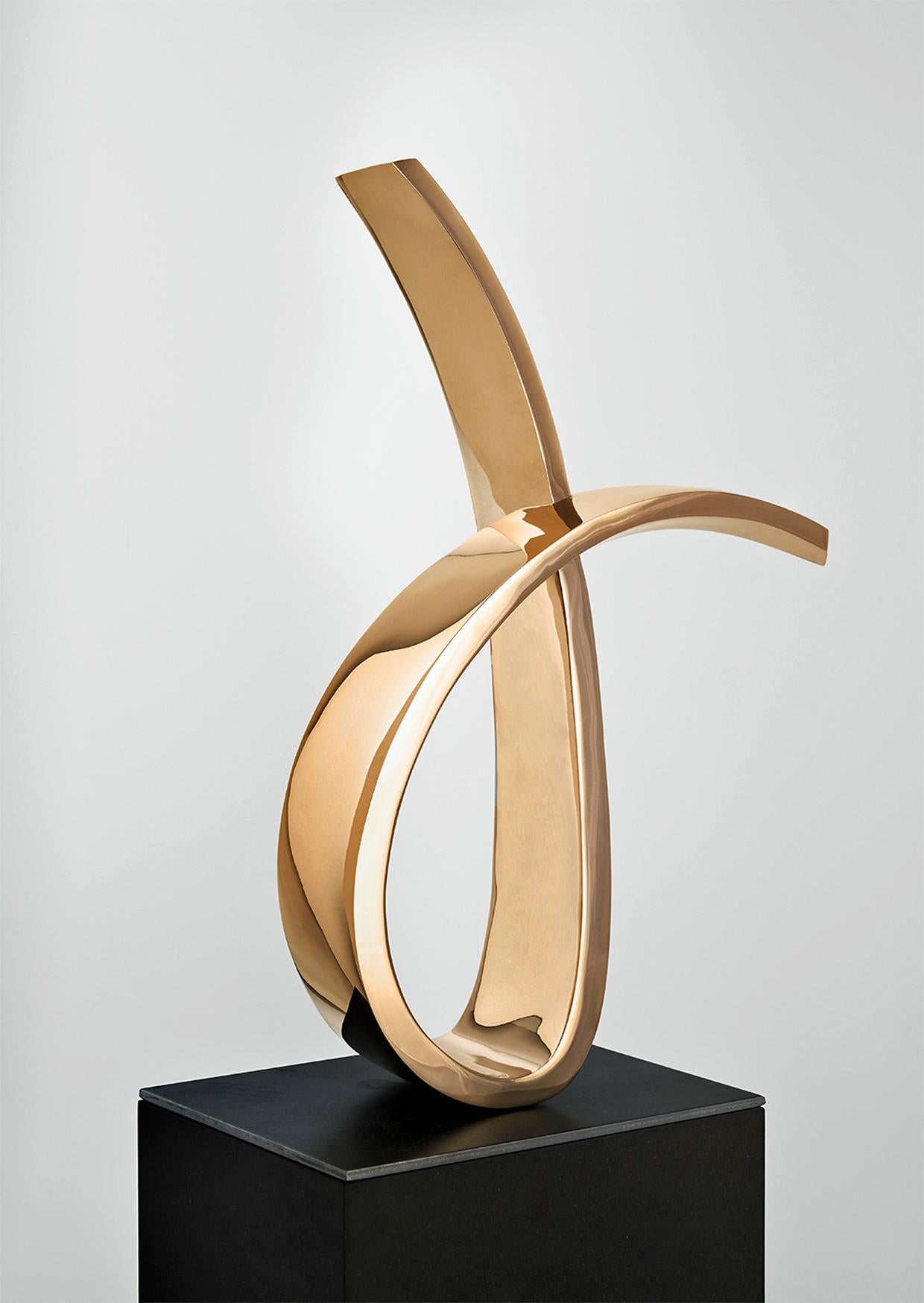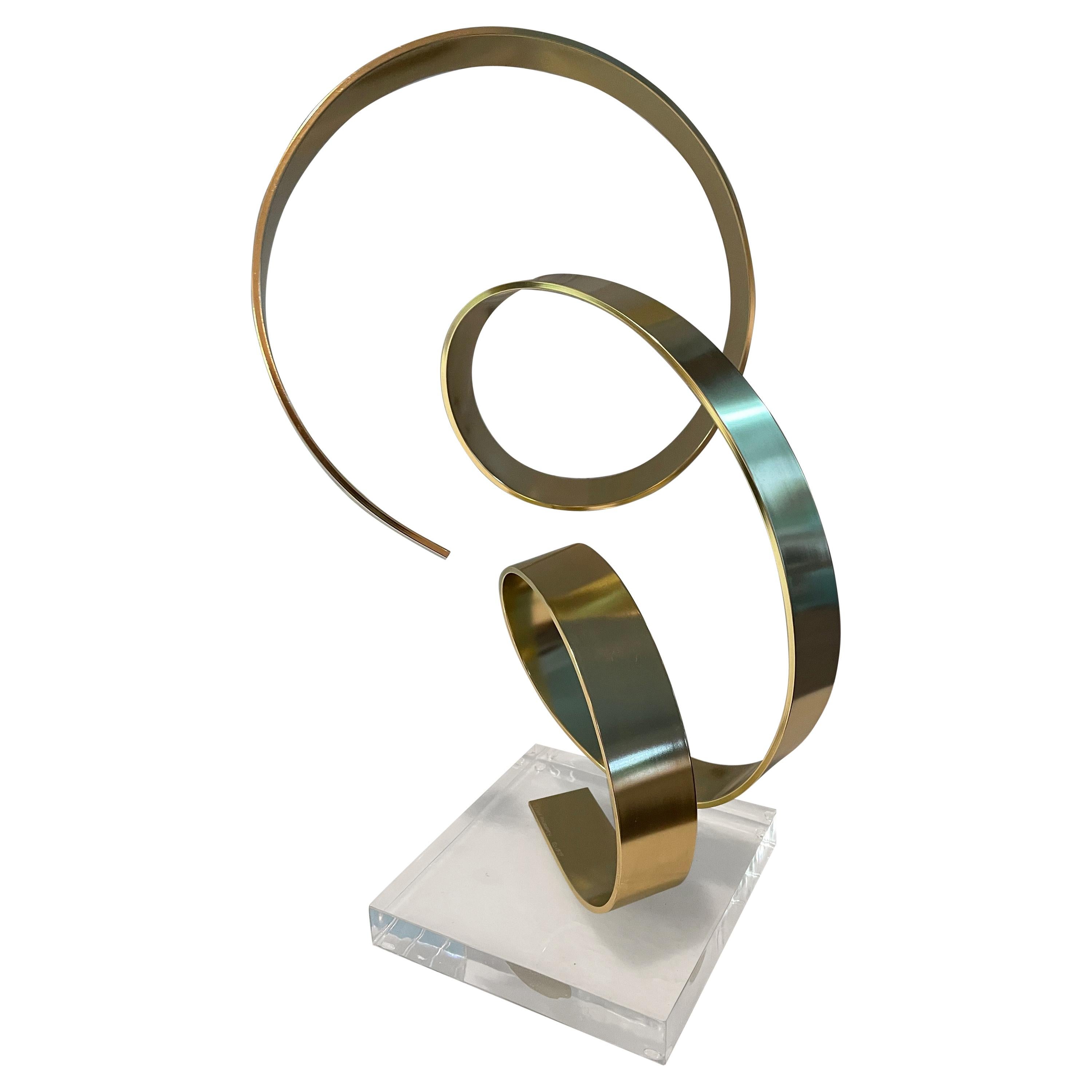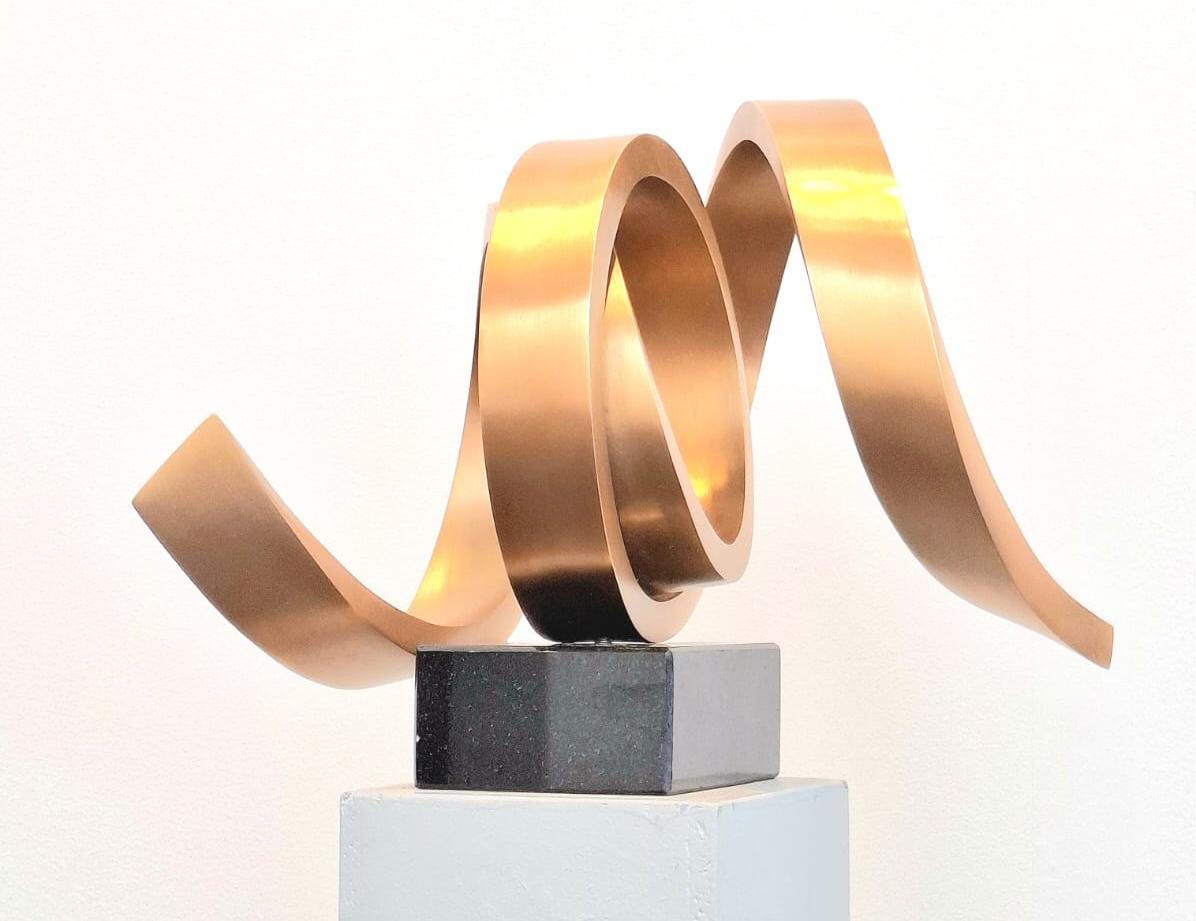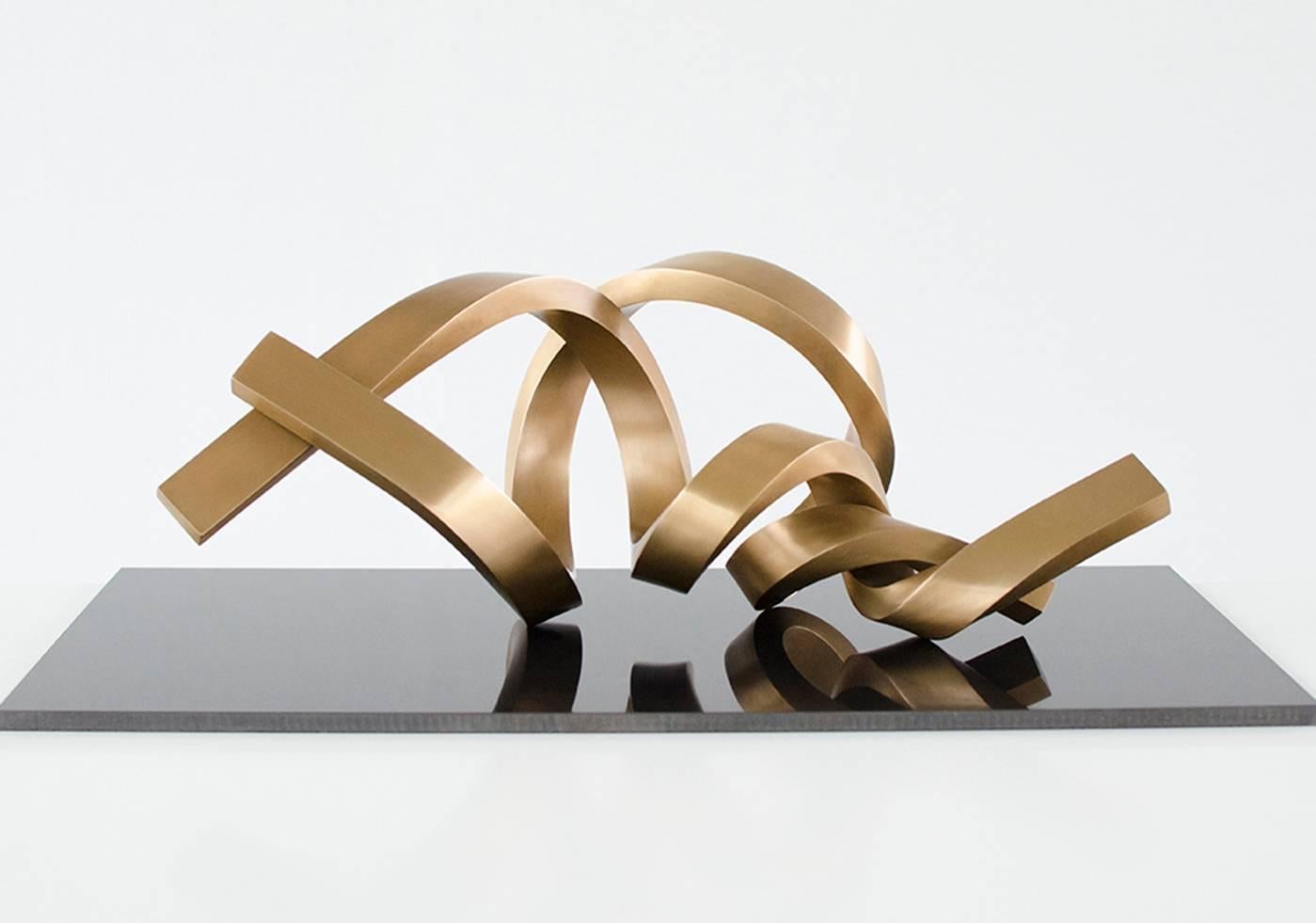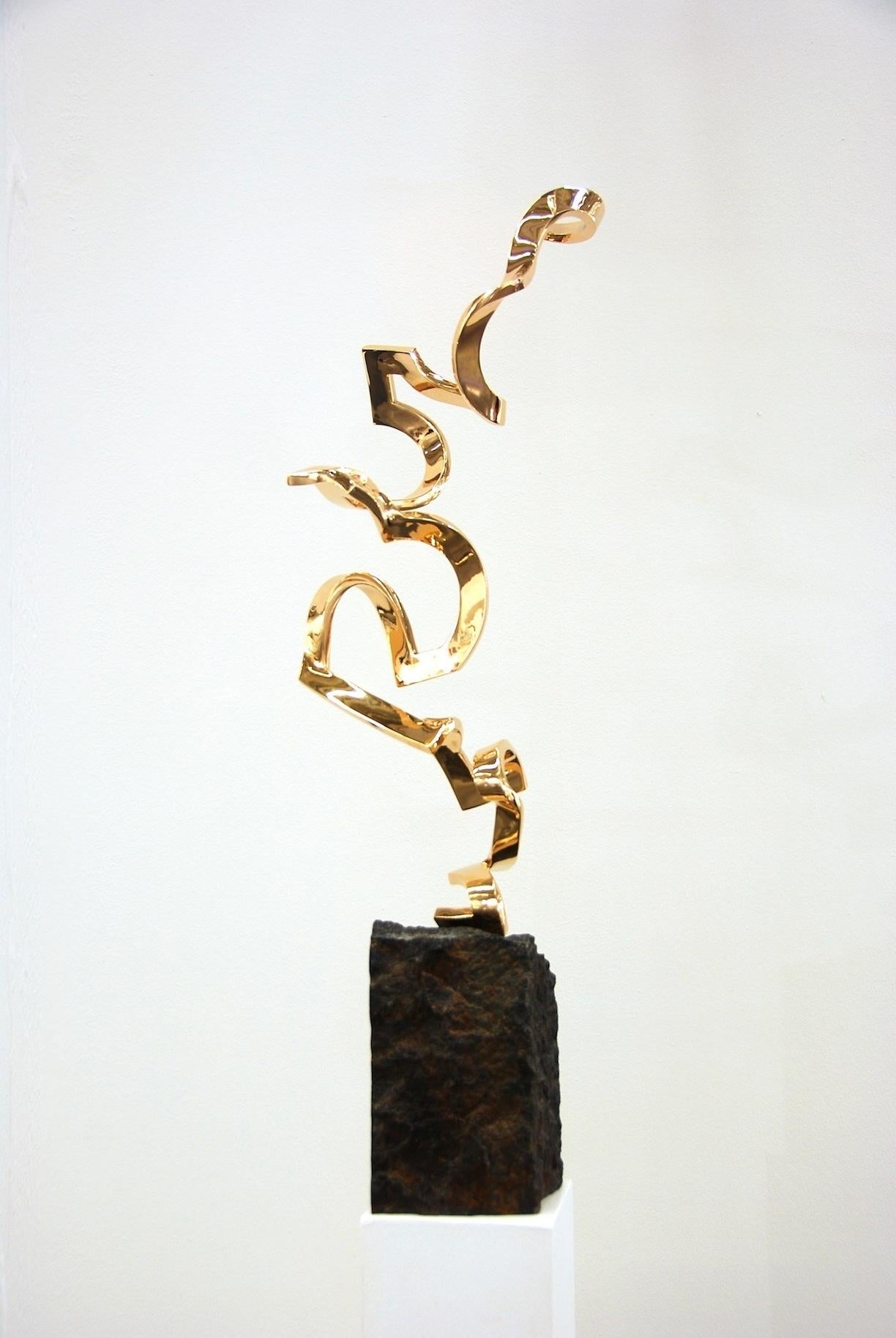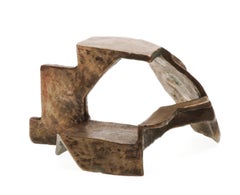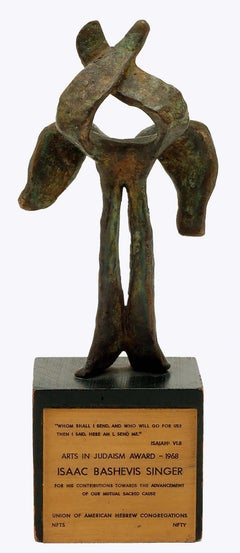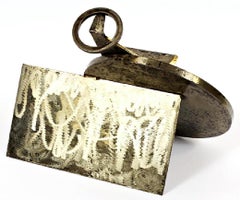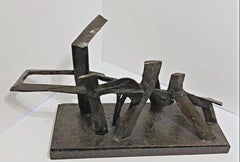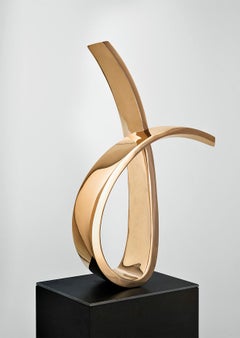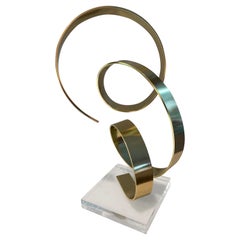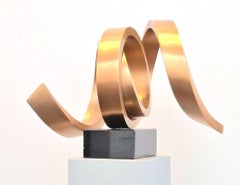Items Similar to Hakuin, Unique signed brass sculpture on plinth, ex GE corporate art collection
Want more images or videos?
Request additional images or videos from the seller
1 of 3
William CrovelloHakuin, Unique signed brass sculpture on plinth, ex GE corporate art collection1984
1984
$10,000
£7,551.60
€8,645.89
CA$14,122.61
A$15,418.51
CHF 8,083.30
MX$187,263.79
NOK 100,947.21
SEK 95,321.08
DKK 64,532.34
About the Item
William Crovello
Hakuin, 1984
Mirrored, reflective brass sculpture on plinth
De-accessioned from the GE Corporate Art Collection
Signed and dated Crovello '84
Measurements:
13 x 13-3/4 x 2-1/4 inches (33.0 x 34.9 x 5.7 cm) (work)
1 x 17-1/2 x 10-1/2 inches (2.5 x 44.5 x 26.7 cm) (plinth)
This work is named after a legendary, Japanese Zen Buddhist Hakuin Ekaku, a major historical figure
William Crovello Biography (written by Marshall Price, Nasher Museum Curator and former curator of the National Academy Museum):
Best known for his large public sculpture. New York City native William Crovello initially studied painting at the Rhode Island School of Design from 1947 to 1951. He entered the air force in 1952 and was stationed in Japan from 1954 to 1955. Following his military duty, Crovello, seeking his expressive muse, returned to Japan in 1957 for four years and became enchanted with the rich tradition of classical calligraphy. The artist absorbed both the deep philosophy and technical execution of the ancient script by immersing himself in calligraphic study.
After returning to New York in 1961, the artist moved to Spain in 1968 and shifted from painting to sculpture, creating forms whose presence activated three-dimensional space. His stone and metal works draw directly from the smooth strokes of the Japanese brush, echoing the graceful brevity and elegant fluidity of an ancient tradition. Following the movement of the calligraphic stroke, Crovello created numerous public sculptures, such as the painted steel Cubed Curve installed in 1972 outside of the Time-Life Building in New York City, and the Swedish granite Katana (1980) in the Donald M. Kendall Sculpture Gardens at PepsiCo, Purchase, New York.
- Creator:William Crovello (1929, American)
- Creation Year:1984
- Dimensions:Height: 13 in (33.02 cm)Width: 13.75 in (34.93 cm)Depth: 2.25 in (5.72 cm)
- Medium:
- Movement & Style:
- Period:
- Condition:The plinth is part of the piece which is drilled to the underside; minor scratches, nicks overall; nicks to the plinth; natural oxidation to the artwork. Otherwise in very good vintage condition.
- Gallery Location:New York, NY
- Reference Number:1stDibs: LU1745216487872
About the Seller
5.0
Platinum Seller
Premium sellers with a 4.7+ rating and 24-hour response times
Established in 2007
1stDibs seller since 2022
451 sales on 1stDibs
Typical response time: 2 hours
- ShippingRetrieving quote...Shipping from: New York, NY
- Return Policy
Authenticity Guarantee
In the unlikely event there’s an issue with an item’s authenticity, contact us within 1 year for a full refund. DetailsMoney-Back Guarantee
If your item is not as described, is damaged in transit, or does not arrive, contact us within 7 days for a full refund. Details24-Hour Cancellation
You have a 24-hour grace period in which to reconsider your purchase, with no questions asked.Vetted Professional Sellers
Our world-class sellers must adhere to strict standards for service and quality, maintaining the integrity of our listings.Price-Match Guarantee
If you find that a seller listed the same item for a lower price elsewhere, we’ll match it.Trusted Global Delivery
Our best-in-class carrier network provides specialized shipping options worldwide, including custom delivery.More From This Seller
View AllAbstract Bronze Sculpture, Unique Signed work from the estate of Arthur Carr
By Peter Reginato
Located in New York, NY
Peter Reginato
Abstract Bronze Sculpture, ca. 1987
Bronze
Signed on the underside
4 × 6 1/2 × 5 1/2 inches
This bronze sculpture is by the American abstract sculptor Peter Reginato. ...
Category
1980s Abstract Abstract Sculptures
Materials
Bronze
Bronze Sculpture to Isaac Bashevis Singer, Arts in Judaism Award signed Judaica
By Nathaniel Kaz
Located in New York, NY
Nathaniel Kaz
Bronze Sculpture to Isaac Bashevis Singer for Arts in Judaism Award, 1966
Bronze, Square wooden base, Metal tag
Signed and dated "66" to back of bronze portion of the w...
Category
1960s Abstract Expressionist Abstract Sculptures
Materials
Metal, Bronze
Welded Brushed Steel Sculpture - geometric abstraction (Unique, signed)
By Michael Todd
Located in New York, NY
Michael Todd
Welded Brushed Steel Sculpture - geometric abstraction, 1968
Welded Brushed Steel
Hand signed and dated 1968 in marker on surface....
Category
1960s Abstract Geometric Abstract Sculptures
Materials
Steel
Uxmal, unique bronze sculpture by Greek-American sculptor and Harvard professor
Located in New York, NY
Dimitri Hadzi
Uxmal, 1991
Cast bronze on custom made granite base
17 × 30 1/2 × 14 inches
The title UXMAL, refers to the ancient Mayan city of Uxmal, which is known for its "Pyramid of the Magician"
Provenance:
Acquired by the original owner from the prestigious Gremillion Gallery in Houston, Texas (accompanied by a copy of the original receipt)
Measurements:
Base:
26.5 by 11 by 1.75 inches
Work longest
30.5 inches
Widest 14 inches
Highest. 17 inches
More about Dimitri Hadzi"
Derived from the figure and mythic narratives, Hadzi’s sculpture references antiquity and classical artifacts – abstracted anatomical forms, columnar and other architectural elements, helmets, weaponry and body armor function as visual metaphors for ancient cultures. “I was interested in mythology, and I was interested in movement,” Hadzi remarked on his years in Rome, “I was attempting through formal methods to exaggerate sexual tension or apprehension. Suddenly I was myself in an atmosphere of freedom.” [1] Powerfully rendered in bronze his sculptures convey raw emotion, brute strength and mass, tempered with a delicate rush of whimsy, vivacity and sensuality.
Born in New York City on March 21, 1921, Hadzi graduated from Cooper Union in 1950 and received a Fulbright Fellowship in the same year. After studying sculpture in Greece, he moved to Rome under the GI Bill where he lived for twenty-five years. Hadzi returned to the U.S. where he taught at Harvard University for fourteen years. He continued to create sculpture until his death in 2006.
Hadzi is included in the permanent collections of the Museum of Modern Art; the Whitney Museum of American Art; the Museum of Fine Arts, Boston; the Hirshhorn Museum and Sculpture Garden; The Phillips Collection and the Guggenheim Museum. Receiving over twenty sculpture commissions, Hadzi’s work appears in public squares, concert halls, federal and private plazas, and universities throughout the world.
---------------
[1] Elsen, Albert. “On Artistic Freedom: An Interview,” Dimitri Hadzi, (New York: Hudson Hills Press, 1996), 30.
Additional Biography:
Dimitri Hadzi (1921 – 2006) is among the most distinguished modernist sculptors, creator of works in bronze and stone that are powerfully abstract and expressionist in character. His contribution to the international language of sculpture continues to influence and inspire through permanent installations and collections, and exhibitions worldwide.
Born to Greek-American immigrant parents in New York City, he had a talent for drawing at an early age and won a prize for his young ability. But, it wasn't until after serving in the Air-force in the South Pacific during WWII that he turned his sights fully to painting and sculpture, going on to study both at Cooper Union. Eventually, he would become a mainstay of the Cambridge, MA art community. He was a Guggenheim Fellow (1957), the winner of the Venice Biennale Award (1962), and the Rome Prize (1974).
His most notable sculptures are: Copley Place Waterfall (Boston, MA), Owen Glass Co. (Toledo, OH), as well as Thermopolis, adjacent to Boston’s City Hall Plaza, and the former Omphalos in Harvard Square (Cambridge, MA).
Hadzi is included in the permanent collections of the Museum of Modern Art; National Gallery of Art; Whitney Museum of American Art; Museum of Fine Art, Boston; Hirshhorn Museum and Sculpture Garden; The Phillips Collection and the Guggenheim Museum.
Additionally, Hadzi was also a prolific painter, and printmaker. He also taught at Harvard University for over a decade. Famously, David Hockney attended one of Hadzi’s classes at the Carpenter Center at Harvard, where Hadzi served as director. The two of them spent time together painting and discussing techniques. Hockney gifted Hadzi one of his paintings.
He worked alongside his good friend, Nobel Prize winning Irish poet...
Category
1990s Abstract Abstract Sculptures
Materials
Granite, Bronze
Famed sculptor Nancy Graves unique signed patinated bronze sculpture NY Award
By Nancy Graves
Located in New York, NY
Nancy Graves
New York State Governor's Arts Award, 1988
Bronze, polychrome patina and baked enamel on base with Award plaque
10 1/4 × 7 × 10 1/4 inches
Hand signed and dated with inc...
Category
1980s Abstract Expressionist Abstract Sculptures
Materials
Enamel, Bronze
$19,600 Sale Price
30% Off
Maquette for Laureate (unique sculpture)
By Seymour Lipton
Located in New York, NY
Seymour Lipton
Maquette for Laureate, ca. 1968-1969
Nickel silver on monel metal
Unique
18 × 8 1/2 × 7 inches
Marlborough-Gerson Gallery, New York
Acquired from the above by the previous owner, 1969
thence by descent
Christie's New York: Monday, June 30, 2008 [Lot 00199]
Acquired from the above Christie's sale This unique sculpture by important Abstract Expressionist sculptor Seymour Lipton is a maquette of the monumental sculpture "Laureate" - one of Lipton's most iconic and influential works located on the Riverwalk in downtown Milwaukee, Wisconsin. Laureate is a masterpiece that was commissioned by the Allen-Bradley Company in memory of Harry Lynde Bradley and as an enhancement for the newly constructed Performing Arts Center. It is located on the east bank of the Milwaukee River at 929 North Water Street. The Bradley family in Milwaukee were renowned patrons of modernist sculpture, known for their excellent taste who also founded an eponymous sculpture park. For reference only is an image of the monumental "Laureate" one of Milwaukee's most beloved public sculptures. According to the Smithsonian, which owns a different unique variation of this work, "The full-size sculpture Laureate was commissioned by the Marcus Center for the Performing Arts in Milwaukee. In the initial drawings, Seymour Lipton combined details from the architectural plan with a wide variety of images, ranging from musical instruments to a lighthouse on the island of Tobago. He transformed the basic shapes from these sketches into a welded sculpture, which evokes a figure composed of columns, harp strings, and coiled rope. Lipton created this piece to celebrate achievement in the arts. The dramatic silhouette commands your attention, reflecting the title Laureate, which means worthy of honor and distinction. The final version of the piece is over twelve feet high and stands out against the pale, flat buildings of the arts center.,,"
Provenance
Marlborough-Gerson Gallery, New York
Acquired from the above by the previous owner, 1969
thence by descent
Christie's New York: Monday, June 30, 2008 [Lot 00199]
Acquired from the above Christie's sale
About Seymour Lipton:
Born in New York City in 1903, Seymour Lipton (1903-1986) grew up in a Bronx tenement at a time when much of the borough was still farmland. These rural surroundings enabled Lipton to explore the botanical and animal forms that would later become sources for his work. Lipton’s interest in the dialogue between artistic creation and natural phenomena was nurtured by a supportive family and cultivated through numerous visits to New York’s Museum of Natural History as well as its many botanical gardens and its zoos. In the early 1920s, with the encouragement of his family, Lipton studied electrical engineering at Brooklyn Polytechnic Institute and pursued a liberal arts education at City College. Ultimately, like fellow sculptor Herbert Ferber, Lipton became a dentist, receiving his degree from Columbia University in 1927. In the late 1920s, he began to explore sculpture, creating clay portraits of family members and friends.
In addition to providing him with financial security, dentistry gave Lipton a foundation in working with metal, a material he would later use in his artwork. In the early 1930s, though, Lipton’s primary sculptural medium was wood. Lipton led a comfortable life, but he was also aware of the economic and psychological devastation the Depression had caused New York. In response, he generally worked using direct carving techniques—a form of sculpting where the artist “finds” the sculpture within the wood in the process of carving it and without the use of models and maquettes. The immediacy of this practice enabled Lipton to create a rich, emotional and visual language with which to articulate the desperation of the downtrodden and the unwavering strength of the disenfranchised. In 1935, he exhibited one such early sculpture at the John Reed Club Gallery in New York, and three years later, ACA Gallery mounted Lipton’s first solo show, which featured these social-realist-inspired wooden works. In 1940, this largely self-taught artist began teaching sculpture at the New School for Social Research, a position he held until 1965.
In the 1940s, Lipton began to devote an increasing amount of time to his art, deviating from wood and working with brass, lead, and bronze. Choosing these metals for their visual simplicity, which he believed exemplified the universal heroism of the “everyman,” Lipton could also now explore various forms of abstraction. Lipton’s turn towards increasing abstraction in the 1940s allowed him to fully develop his metaphorical style, which in turn gave him a stronger lexicon for representing the horrors of World War II and questioning the ambiguities of human experience. He began his metal work with cast bronze sculptures, but, in 1946, he started welding sheet metal and lead. Lipton preferred welding because, as direct carving did with wood, this approach allowed “a more direct contact with the metal.”[ii] From this, Lipton developed the technique he would use for the remainder of his career: “He cut sheet metal, manipulated it to the desired shapes, then joined, soldered, or welded the pieces together. Next, he brazed a metal coating to the outside to produce a uniform texture.”[iii]
In 1950, Lipton arrived at his mature style of brazing on Monel metal. He also began to draw extensively, exploring the automatism that abstract expressionist painters were boasting at the time. Like contemporaries such as Jackson Pollock, Lipton was strongly influenced by Carl Jung’s work on the unconscious mind and the regenerative forces of nature. He translated these two-dimensional drawings into three-dimensional maquettes that enabled him to revise his ideas before creating the final sculpture.The forms that Lipton produced during this period were often zoomorphic, exemplifying the tension between the souls of nature and the automatism of the machine.
In the years following the 1950s, Lipton’s optimism began to rise, and the size of his work grew in proportion. The oxyacetylene torch—invented during the Second World War—allowed him to rework the surfaces of metal sculptures, thus eliminating some of the risks involved with producing large-scale finished works. In 1958, Lipton was awarded a solo exhibition at the Venice Biennale and was thus internationally recognized as part of a small group of highly regarded avant-garde constructivist sculptors. In 1960, he received a prestigious Guggenheim Award, which was followed by several prominent public commissions, including his heroic Archangel, currently residing in Lincoln Center’s David Geffen Hall.
A number of important solo exhibitions of his work followed at The Phillips Collection in Washington, DC (1964); the Milwaukee Art Center and University of Wisconsin, Milwaukee (1969); the Virginia Museum of Fine Arts in Richmond (1972); the Everson Museum in Syracuse, NY (1973); the Herbert E. Johnson Museum of Art of Cornell University in Ithaca, NY (1973); the National Collection of Fine Arts, Smithsonian Institution (now the Smithsonian American Art Museum) in Washington, DC (1978); and a retrospective in 1979 at The Jewish Museum in New York. In 1982 and 1984 alone, two exhibitions of his sculpture, organized respectively by the Mint Museum (Charlotte, NC) and the Hillwood Art Gallery of Long Island University (Greenvale, NY), traveled extensively across museums and university galleries around the nation. In 2000, the traveling exhibition An American Sculptor: Seymour Lipton was first presented by the Palmer Museum of Art of Pennsylvania State University in University Park. Most recently, in 2009, the Ackland Art Museum in Chapel Hill, NC mounted The Guardian and the Avant-Garde: Seymour Lipton’s Sentinel II in Context.
Since 2004, Michael Rosenfeld Gallery has been the exclusive representative of the Estate of Seymour Lipton and has presented two solo exhibitions of his work—Seymour Lipton: Abstract Expressionist Sculptor (2005) and Seymour Lipton: Metal (2008). In 2013, Michael Rosenfeld Gallery presented Abstract Expressionism, In Context: Seymour Lipton, which included twelve major sculptures by the artist, along with works by Charles Alston, Norman Bluhm, Beauford Delaney, Willem de Kooning, Jay DeFeo, Michael Goldberg, Adolph Gottlieb, Hans Hofmann, Lee Krasner, Norman Lewis, Conrad Marca-Relli, Boris Margo, Alfonso Ossorio, Richard Pousette-Dart, Milton Resnick, Charles Seliger...
Category
1960s Abstract Expressionist Abstract Sculptures
Materials
Metal, Silver
You May Also Like
Bronze Sculpture 'O.T. VIII' by Carola Eggeling, Bronze Polished
By Carola Eggeling
Located in Paris, FR
Bronze Sculpture 'O.T. VIII' by Carola Eggeling
Abstract sculpture with beautiful curved lines.
German bronze sculpture
Bronze Polished
Numbered and signed artwork
Limited edition ...
Category
21st Century and Contemporary Abstract Abstract Sculptures
Materials
Bronze
Infinitum Big by Kuno Vollet - Gold polished Bronze Sculpture on Granite Base
By Kuno Vollet
Located in DE
Artist: Kuno Vollet
Title: Infinitum Big
This elegant original cast bronze sculpture by German artist Kuno Vollet brings energy into any art collection.
Each sculpture is differen...
Category
21st Century and Contemporary Abstract Abstract Sculptures
Materials
Granite, Bronze
1979 Brass Abstract Sculpture by Dan Murphy
By Dan Murphy
Located in Winnetka, IL
This is a lovely brass metal abstract sculpture by Dan Murphy in 1979 and is mounted on a lucite base.
Category
Vintage 1970s American Abstract Sculptures
Materials
Brass
Balance 4 by Kuno Vollet - Gold polished Bronze Sculpture Granite Base
By Kuno Vollet
Located in DE
Artist: Kuno Vollet
This elegant original cast bronze sculpture by German artist Kuno Vollet brings energy into any art collection.
Each sculpture is different and the gold and bla...
Category
21st Century and Contemporary Abstract Abstract Sculptures
Materials
Granite, Bronze
Infinitum by Kuno Vollet -Contemporary Abstract Gold Bronze sculpture
By Kuno Vollet
Located in DE
Artist: Kuno Vollet
Title: Infinitum
Materials: Polished Bronze sculpture with a gold patina
Size: 45cm x 25 cm x 25 cm
About the Gallery:
Folly and Muse was established in 20...
Category
21st Century and Contemporary Abstract Abstract Sculptures
Materials
Bronze
Light as Air by Kuno Vollet - Gold polished Bronze Sculpture on Granite Base
By Kuno Vollet
Located in DE
Artist: Kuno Vollet
Title: Light as Air
Materials: Bronze sculpture polished to a sparkling gold on granite base
Size: 65cm height of upper sculpture, base: 18x 18 cm
Takes aroun...
Category
21st Century and Contemporary Abstract Abstract Sculptures
Materials
Granite, Bronze
